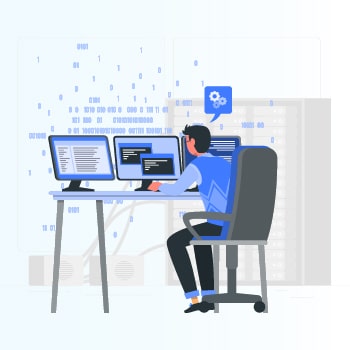
Content
- An Overview of Python Unit Testing
- Why is Python Unit Testing Performed?
- Key Features of a Reliable Python Unit Test
- Top Python Unit Testing Frameworks to Look for in 2023
- Conclusion
- How can TestingXperts Help with?
An Overview of Python Unit Testing

Python unit tests are scripted code-level tests written in Python to verify a small “unit” of functionality. Unit tests in general are often designed to provide a broad testing coverage of the web application, including any weird corner cases and some tests that should not work. Interaction is minimal with resources such as networks and databases. The code relying on these resources for Python unit testing is typically tested through functional, automated acceptance, and/or integration tests.
Why is Python Unit Testing Performed?

Python unit testing focuses on checking whether the software is behaving correctly, which means checking that the mapping between the inputs and the outputs is all done correctly. Unit testing helps in the early identification of bugs so that they aren’t propagated to higher levels of the software system.
Other advantages of Python unit testing include the following:
Simplifying integration:
By ensuring that all the components work well individually, it’s easier to solve integration problems.
Minimizing code regression:
With a good amount of test cases, if future modifications to the source code will cause problems, it’s easier to locate the issue.
Providing documentation:
Unit tests provide documentation on how the method or class under test works by testing the correct mapping between input and output.
How to perform Python Unit Testing?
Unit testing in Python is a software testing methodology where individual units or components of a software application are tested in isolation to ensure their correctness. A unit can be a function, method, class, or module. Unit testing aims to identify defects early in the development process and provide a way to verify that each component of the software performs as expected.
Key concepts in unit testing:
Test Case: A test case is a self-contained unit of testing that focuses on a specific aspect of the code. It includes the input data, the action being tested, and the expected output.
Assertions: Assertions are statements that verify the expected behavior of the code under test. They are used to compare the actual output with the desired output and raise an error if they don’t match.
Test Fixture: A test fixture is the preparation and cleanup work necessary to perform a test. It can include setting up initial conditions, such as creating objects, setting variables, and preparing the environment.
Test Suite: A test suite is a collection of grouped test cases. It allows you to run multiple tests together, making it easier to manage and execute tests for a specific part of the code.
Test Runner: A test runner is a tool or framework that automates the execution of test cases and provides reports on the test results. In Python, the built-in unittest module provides a test runner for executing tests.
Mocking and Stubs: Mocking and stubbing are techniques used to replace parts of the code that are external dependencies (such as databases or web services) with simulated or controlled implementations. This helps isolate the unit being tested from its dependencies.
Isolation: Unit tests should be isolated to ensure that failures in one test don’t affect others. This is achieved by resetting the state between tests and avoiding shared resources.
Coverage: Test coverage measures the percentage of code executed during testing. It helps identify areas of the code that are not adequately tested.
Key Features of a Reliable Python Unit Test
Promote Rapid Testing:
Unit tests are mostly executed automatically, which means they must be fast. Developers intend to skip slow unit tests because they don’t provide instant feedback.
Ensure Isolation:
Unit tests are standalone. They test the individual unit and do not depend on anything external (like a file or a network resource).
Repeatable:
Unit tests are executed repeatedly, and the result must be consistent over time.
Enable Reliability:
Unit tests fail when there’s a bug in the system or application under test. The environment or the order of execution of the tests shouldn’t matter.
Accurate Naming:
The name of the test should provide relevant information about the test itself.
Top Python Unit Testing Frameworks to Look for in 2023

Let’s go through a list of some of the best Python Unit Testing Frameworks and understand their key features:
TestProject
• Single Agent executable includes all the 3rd party libraries needed to execute and develop test automation for mobile and web tests.
• Screenshot-based automatic reports in HTML/PDF format.
• Execution history accessible through RESTful API.
• Always updated with the latest and stable Selenium/Appium driver versions.
Common SDK for Web, Android, and iOS-based testing.
• Built-in test runner and reporting capabilities.
• Cross-platform assistance for Mac, Windows, Linux, and Docker.
• Extensive support from the community through forums, blogs, and live chat.
Robot Framework
• RF is based on keyword-driven testing. It makes automation simpler by helping testers easily create readable test cases.
• Enables easy usage of test data syntax.
• Supports all operating systems (macOS, Windows, Linux) and all application types, such as web and mobile apps.
• Easy-to-understand report data
• Its many APIs and rich ecosystem make it highly extensible and easy to integrate with third-party tools.
• It is equipped with numerous generic tools and test libraries, each of which can be individually used in separate projects.
• Good community support.
Doctest
• Doctest is a simple, easy-to-use unit testing framework.
• The testing script goes in docstring with a small function at the bottom of the file that runs it.
• Lets testers test the code by running examples included in the documentation and verifying that they return the desired results.
• After parsing the help text, Doctest searches for examples, runs them, and compares the output against the expected value.
• Docstrings serve as tangible examples and tests of the functions they document.
Behave
• Supports environmental functions, fixtures, configuration settings, etc.
• Often scenario comes with a multitude of data sets. Behave can run tests on each line that does not have headings that appears in the data tables.
• PyCharm integration.
• Documentation support for the tool is impeccable.
• With the help of Behave, even non-technical people can create test cases or test scenarios.
Nose 2
• Nose 2 supports all the latest Python versions.
• Nose 2 loads all the tests first, then starts the execution.
• One of the biggest features of Nose2 is that it does not require a custom importer. All it needs is __import__().
• Supports the same kind and level of fixtures as Unittest.
• Supports all test generators in test classes, unit tests, test functions, and in Case subclasses.
• Config files can do all the configuration.
• Nose2 can invade the test running process with nose2.collector.collector(). This is a test runner hidden inside each test case. Even though it runs tests as normal Nose2, it can run its test runner and tests.
Testify
• Used for unit testing, integration testing, and system testing.
• For those familiar with Unittest, Testify is very easy to start with.
• Has extensive plugins.
• Similar to Nose2, Testify enables test discovery.
• Simple syntax to fixture method.
PyTest
• Provides a compact and simple test suite.
• Highly extensible with many plugins, such as the Pytest HTML plugin, which can be added to a project to print HTML reports with a single command-line option.
• It has significant community support.
• It helps to cover all parameter combinations without rewriting test cases.
Conclusion
Python is an easy-to-use language with various features and community support, making it an excellent choice for test automation by testers. Thus, the automation testing framework developed in Python is considered a good choice for test automation. Python testing framework makes the test automation process easy and fast, which helps testers to test and release software faster. It ultimately enables businesses to achieve quality software quickly and deliver a great CX. Businesses should therefore leverage Python test automation services from a next-gen QA and software testing services provider to get superior products and reach the market early.
How can TestingXperts Help

Our wide range of QA testing services includes:
Test Advisory:
TestingXperts’ Test Advisory Services provide you with specialist advice to help you achieve overall product quality, reduced release cycle time, faster time-to-market, and significant reductions in QA costs. Our Test advisory services will help you move to the next maturity level in QA.
DevOps Consulting Services:
Our DevOps experts will analyze your business needs and help you achieve a strategic DevOps adoption roadmap. Our wide range of DevOps services like DevOps consulting, DevOps CI/CD implementation, Enterprise DevOps Transformation, IAC consulting and Implementation, and Test Automation in DevOps will help you achieve faster and quality releases.
Test Automation:
We have in-house test automation experts with rich expertise in industry-leading test automation tools. We can help you reduce regression time and cost with our end-to-end test automation services with our in-house test automation accelerator Tx-Automate.
Functional Testing:
Tx has years of experience providing functional testing services for clients across domains. Our wide range of available testing services includes automation, manual, regression, and mobile application testing. We have in-house mobile test labs with numerous mobile devices.
Non-Functional Testing:
Tx provides a wide range of non-functional testing services such as performance and load testing, security testing, usability testing, and accessibility testing. We also have an in-house performance testing accelerator, ‘Tx-PEARS,’ which helps with all non-functional testing requirements, including continuous monitoring of your infrastructure in production as well as in lower environments.
Next-gen Testing:
Our wide range of next-gen testing services includes AI testing, RPA testing using UiPath Test Suite, Digital testing, IoT testing to name a few.
Discover more
Get in Touch
Stay Updated
Subscribe for more info



